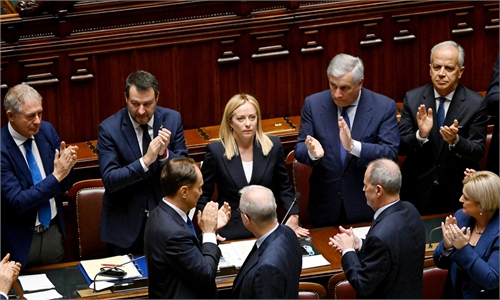
Italian Prime Minister Giorgia Meloni arrives for a summit at EU parliament in Brussels, on February 9, 2023. Photo: VCG
Italy has ruled that China's Sinochem cannot designate the CEO of tire firm Pirelli despite being its main shareholder with a 37 percent stake, Reuters reported on Monday. Experts urged Italy not to generalize the “national security” concept and to create a fair and stable environment for Chinese companies in the country.
Rome's move came after Sinochem notified the Italian government in March of plans to renew and update an existing shareholder pact with fellow investor Camfin, the vehicle of Pirelli's CEO Marco Tronchetti Provera.
Under the previous revised pact between Camfim and Sinochem, Tronchetti Provera would lose powers he currently enjoys to designate the group's CEO from 2026, leaving that task to Pirelli's Chinese-controlled board, Reuters said.
Prime Minister Giorgia Meloni's administration examined the pact under the so-called "Golden Power" rules aimed at protecting assets deemed strategic for the country. On Friday, Italy said it had imposed restrictions aimed at shielding "the autonomy of Pirelli," including a requirement that "some" strategic decisions by its board of directors should require approval by at least 80 percent of directors.
“Italy’s move is undoubtedly a generalization of the concept and standards of national security, and unreasonably suppressed Chinese companies,” Dong Dengxin, director of the Finance and Securities Institute of Wuhan University of Science and Technology, told the Global Times on Monday.
Dong added that the local tiremaking industry in Italy is so mature that there are no technical security issues, let alone threats to information security. He noted that the move may affect the cooperation between China and Italy in the field of trade, and will directly affect the business environment in Italy, which will discourage other Chinese companies from investing and developing in the country.
China is Italy's largest trading partner in Asia. Bilateral trade has seen strong growth for the past three consecutive years, reaching a record high of $77.88 billion in 2022.
Italy in 2019 became the first and so far the only G7 nation to sign up to the China-proposed Belt and Road Initiative (BRI). However, earlier this year, it said that the country is reviewing whether to renew the BRI Memorandum of Understanding with China.
Any move that undermines bilateral relations will directly affect the real interests of both countries, experts noted, adding that there is no need for European countries to give up opportunities for cooperation and mutual benefits because of paranoid hype.

